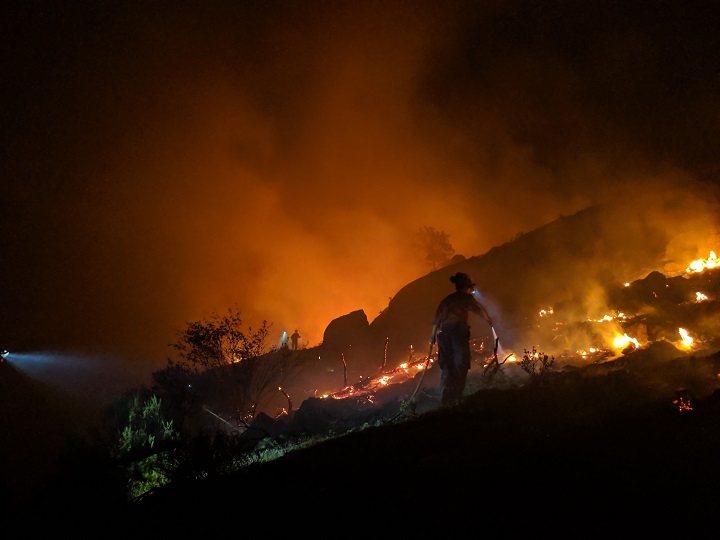British Columbia’s summer wildfire season has come and gone, and what a difference a year makes.

The statistics are now in for the period from April 1 to Oct. 1, and the differences compared to last year are staggering.
The BC Wildfire Service says the province saw just 784 fires in the six-month period, way down from the 2,087 fires that raged across B.C. during the record 2018 season.
When area burned is factored in, the difference is even more stark. Just 20,965 hectares — about the size of Kelowna — burned in 2018, compared to a massive 1.348 million hectares the previous summer, which is nearly half the area of Vancouver Island.
The province ended up saving a bundle as a result. Crews spent $125.5 million fighting fires this summer, about 27 per cent of the massive $455 million spent last year.
The 2019 season was also far milder than the 10-year average, which saw about 1,600 fires burning an average of 400,000 hectares.

That 10-year average is also somewhat skewed on the high side because of the last several, unusually intense fire seasons.

Get breaking National news
Forecasts had predicted yet another extremely challenging fire season, with heightened concern amid studies showing a link between climate change and the severity of wildfires.
But while June and July were the hottest months ever recorded globally, B.C. got a break from Mother Nature, which dampened forests across the province.
“This year what we saw is we had frequent rains, so not large amounts of rain in one period, but spread out kind of weekly,” BC Wildfire Service fire information officer Hannah Swift said.
“So the fuel on the ground didn’t have enough time to dry up the same way that it did in 2017 and 2018.”
After a warm and dry spring, many areas of the central and northern parts of the province actually saw seasonably cool conditions. Even the southern parts of the province, which was warmer and drier than normal, benefited from well-timed rainfall, the BC Wildfire Service said.
Just one part of B.C., the northwest, saw a short campfire ban this summer, a fact that might seem surprising to some in B.C. after back-to-back extreme fire seasons and widespread bans in recent years.
But Swift said it would be a mistake to consider the milder 2019 an anomaly, noting that the coastal, Kamloops and Prince George fire seasons all escaped without a campfire ban in 2016.

While 2017 and 2018 don’t necessarily represent a “new normal” as previously predicted, Swift said the province also needs to be ready for more extreme fire seasons.
“It’s just like the weather, you really can’t predict it and things are becoming more erratic,” she said. “We just have to play it year to year.”
While wildfire crews are unable to predict what will happen next season, Canada’s Changing Climate Report, a document produced by scientists from the Ministry of Environment and Climate Change, Fisheries and Oceans Canada and Natural Resources Canada this summer, suggests increasing future fire risk is very real.
The study found the province had warmed by an average of nearly 2 C since 1948, and could climb by another 1.3 C to 1.9 C by 2050.
The authors concluded that summer droughts are also likely to increase in frequency, while spring runoff will come earlier leaving declines in summer streamflows, factors that leave the province open to heightened wildfire risk.
A preliminary provincial climate risk assessment released in July noted B.C. could see “catastrophic” consequences over the next 30 years from increased climate change-related events, including wildfires.
That report predicts those consequences include a loss of life, natural resources and billions of dollars from the economy.
—With files from Sean Boynton
- Big B.C. election promises from both frontrunners mean big spending ahead
- Deal with BC Hydro could spare northern B.C. community millions to fix water quality
- ‘I ain’t stopping for no red light,’ said B.C. hit-and-run driver before deadly crash
- BC NDP say housing speculation tax working, pledge to double it









Comments